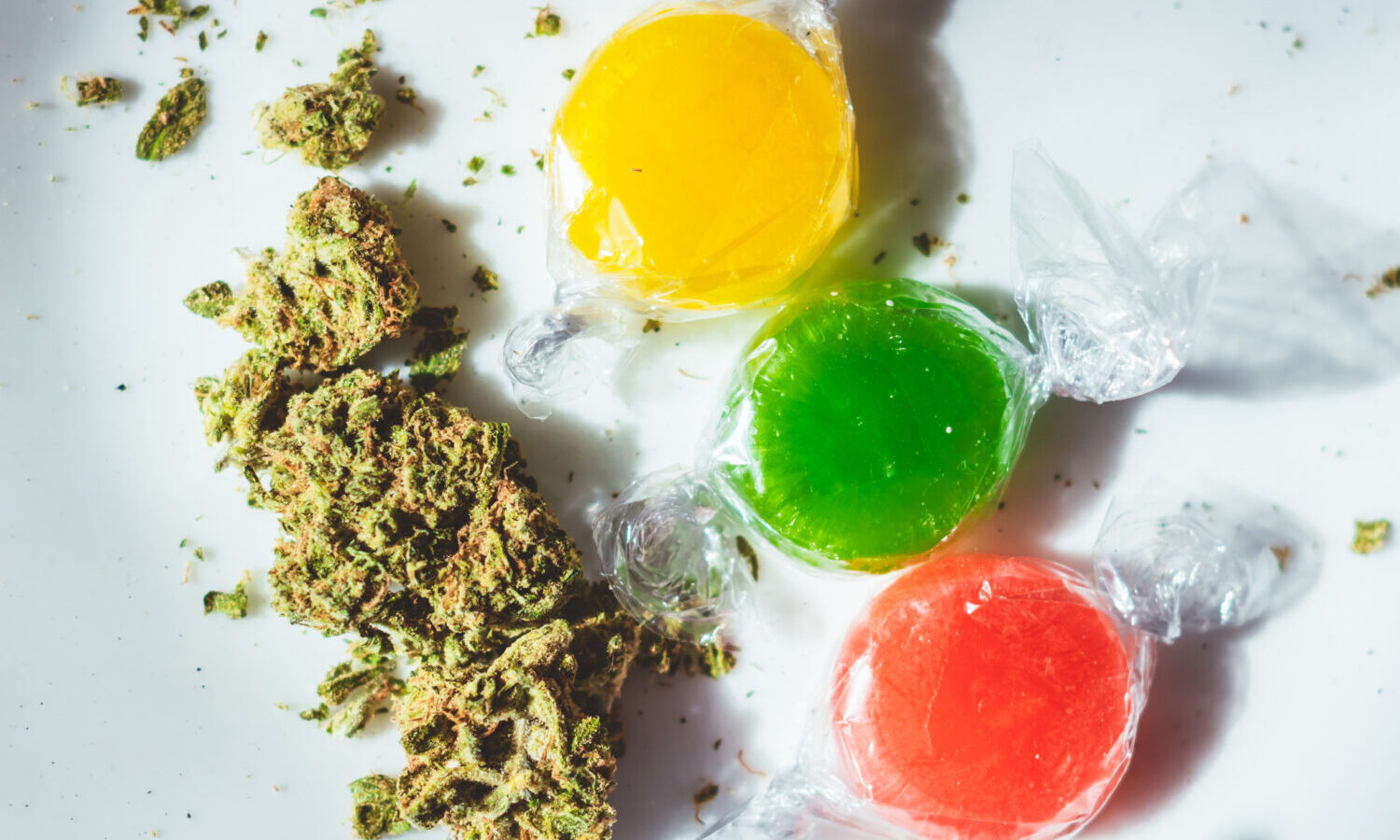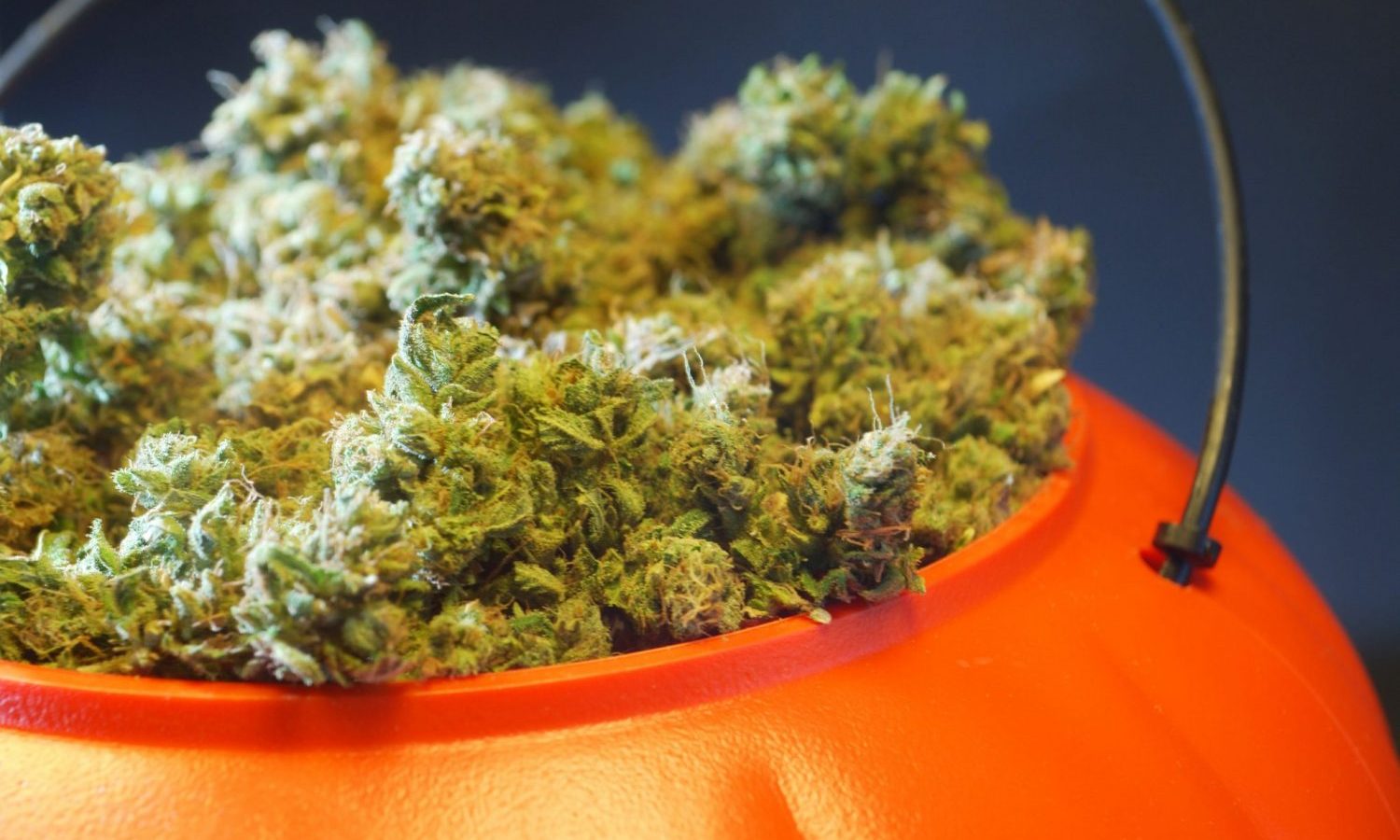Healthcare
No One Is Giving Your Kids Weed At Halloween, But Here’s How To Prevent Them From Eating Some By Accident

Since it’s virtually impossible to tell an edible from regular food these days, it’s become critical for parents and guardians to take extra care around children.
People who give children THC edibles give all the other responsible consumers a bad rep. And with Halloween just around the corner, it’s important for parents to keep their kids safe from THC-infused edibles disguised as candy.
For us adults, the fact that cannabis edibles don’t smell or taste differently from regular candy is a bonus — but that obviously is not okay for kids. We don’t want young ones to suffer from getting high, and worrying their parents sick for that matter.

There has been an increase in cases of children consuming cannabis in states where it’s legal. In Colorado, there was even a case of a two year old child having a marijuana overdose. Meanwhile, in other mature markets like Colorado and California, kids around the age of 8 suffered from cannabis poisoning. It is certainly rare, but there is still a chance of it happening.
Since it’s virtually impossible to tell an edible from regular food these days, it’s become critical for parents and guardians to take extra care around children. They have no idea they’re ingesting cannabis edibles. Many companies even manufacture edibles and sell them in packaging designed to look like popular brands of candy, cookies, and cereal.
While marijuana is well-tolerated by adults, it can be traumatic and severe for young children and infants. In many cases, they have to be taken to the emergency room of a hospital to help manage their symptoms.
Edibles may take a while for its effects to be felt, even in children. Here are some signs you can look out for:
- Weakness
- Panic
- Intoxication
- Excessive sleepiness
- Paranoia
- Slurred speech
- Slowed breathing
- Ataxia (difficulty balancing)
You know your child best, so observe for other signs and behaviors that aren’t typical of them.

However, there are some ways you can prevent your kids from accidentally ingesting cannabis edibles. This isn’t important just around Halloween, but year-round:
- Go trick or treating with your kids, and don’t accept homemade candies without properly sealed packaging from known brands. Check for any treats that may have been tampered with. Throw away any candy that has been opened.
- Tell your trick-or-treaters not to consume any candy before you personally inspect them. At the very least, if they are old enough, ask them to keep all the wrappers so that you can check if there were any edibles given to them in the bags. If you live in a state where cannabis is legal either medically or recreationally, any good parent will take the few minutes it requires to inspect the Halloween candy of their child before they consume it.
- Talk to your children about the potential risks of accidentally eating marijuana edibles. This will educate them about the stress and the dangers of ingesting marijuana. It would also be a good opportunity for older children and teens to have discussions about underage use of marijuana and what it can do to their health, paving the way to talk about alcohol and tobacco use too.
While the nationwide cases are few and far in between, it’s still best to avoid the risk. THC edibles are also more costly compared to actual candy, so the chances of adults giving them out is truly rare. But you never know if you have someone malicious lurking around your neighborhood that could actually lace candy and give some out.
If you are a cannabis-consuming parent yourself, it always helps to keep the candies far away from children’s reach. Treat them the same way you would toxic products and pharmaceutical medications. Using child-safe or child-resistant packaging is always recommended, especially with a clear label.

What To Do If You Think Your Child Ate And Edible
In the event that you suspect your child may have eaten marijuana edibles, the most important thing to do first is to stay calm.
Try to obtain information such as by checking what candy or edible your child may have possibly consumed. See how much they ate by comparing how much was in the package, and how much of it is left. Check for any information on the packaging about how much THC it contains.
If you notice that your child is excessively sleepy, breathing deeply, having a hard time breathing, or any other changes in their normal behavior, calling 9-1-1 is best.
Alternatively, you can also visit the nearest emergency room and give them as much information as you possibly can. You may also call poison control even if your child is acting normally. They will let you know if you can monitor your child from the comfort at home, and when it’s best for them to see a medical professional.
The most important thing to remember is that no child has ever died from a marijuana overdose. They will be uncomfortable for a while, but all will be fine. It’s just best to avoid getting their hands into THC edibles for the meantime.
Business
New Mexico cannabis operator fined, loses license for alleged BioTrack fraud

New Mexico regulators fined a cannabis operator nearly $300,000 and revoked its license after the company allegedly created fake reports in the state’s traceability software.
The New Mexico Cannabis Control Division (CCD) accused marijuana manufacturer and retailer Golden Roots of 11 violations, according to Albuquerque Business First.
Golden Roots operates the The Cannabis Revolution Dispensary.
The majority of the violations are related to the Albuquerque company’s improper use of BioTrack, which has been New Mexico’s track-and-trace vendor since 2015.
The CCD alleges Golden Roots reported marijuana production only two months after it had received its vertically integrated license, according to Albuquerque Business First.
Because cannabis takes longer than two months to be cultivated, the CCD was suspicious of the report.
After inspecting the company’s premises, the CCD alleged Golden Roots reported cultivation, transportation and sales in BioTrack but wasn’t able to provide officers who inspected the site evidence that the operator was cultivating cannabis.
In April, the CCD revoked Golden Roots’ license and issued a $10,000 fine, according to the news outlet.
The company requested a hearing, which the regulator scheduled for Sept. 1.
At the hearing, the CCD testified that the company’s dried-cannabis weights in BioTrack were suspicious because they didn’t seem to accurately reflect how much weight marijuana loses as it dries.
Company employees also poorly accounted for why they were making adjustments in the system of up to 24 pounds of cannabis, making comments such as “bad” or “mistake” in the software, Albuquerque Business First reported.
Golden Roots was fined $298,972.05 – the amount regulators allege the company made selling products that weren’t properly accounted for in BioTrack.
The CCD has been cracking down on cannabis operators accused of selling products procured from out-of-state or not grown legally:
- Regulators alleged in August that Albuquerque dispensary Sawmill Sweet Leaf sold out-of-state products and didn’t have a license for extraction.
- Paradise Exotics Distro lost its license in July after regulators alleged the company sold products made in California.
Golden Roots was the first alleged rulebreaker in New Mexico to be asked to pay a large fine.
Source: https://mjbizdaily.com/new-mexico-cannabis-operator-fined-loses-license-for-alleged-biotrack-fraud/
Business
Alabama to make another attempt Dec. 1 to award medical cannabis licenses

Alabama regulators are targeting Dec. 1 to award the first batch of medical cannabis business licenses after the agency’s first two attempts were scrapped because of scoring errors and litigation.
The first licenses will be awarded to individual cultivators, delivery providers, processors, dispensaries and state testing labs, according to the Alabama Medical Cannabis Commission (AMCC).
Then, on Dec. 12, the AMCC will award licenses for vertically integrated operations, a designation set primarily for multistate operators.
Licenses are expected to be handed out 28 days after they have been awarded, so MMJ production could begin in early January, according to the Alabama Daily News.
That means MMJ products could be available for patients around early March, an AMCC spokesperson told the media outlet.
Regulators initially awarded 21 business licenses in June, only to void them after applicants alleged inconsistencies with how the applications were scored.
Then, in August, the state awarded 24 different licenses – 19 went to June recipients – only to reverse themselves again and scratch those licenses after spurned applicants filed lawsuits.
A state judge dismissed a lawsuit filed by Chicago-based MSO Verano Holdings Corp., but another lawsuit is pending.
Source: https://mjbizdaily.com/alabama-plans-to-award-medical-cannabis-licenses-dec-1/
Business
Pot Odor Does Not Justify Probable Cause for Vehicle Searches, Minnesota Court Affirms

The Minnesota Supreme Court affirmed that cannabis odor does not constitute probable cause to search a vehicle.
If Minnesota police search a vehicle solely based upon the smell of pot, they can’t justify searching a vehicle, even if there is evidence found of other alleged crimes. Even after appealing a lower court decision to suppress the evidence—twice—the Minnesota Supreme Court agreed, and the dismissal of his charges stands.
In a ruling filed regarding a case the State of Minnesota Court of Appeals on Sept. 13, the Minnesota Supreme Court affirmed that cannabis odor does not constitute probable cause to search a vehicle.
The case has been ongoing for two years. On July 5, 2021, just before 10 p.m., a Litchfield police officer stopped a car for an obscure local law: the light bar mounted on the vehicle’s grill had more auxiliary driving lights than are permitted under Minnesota law. The officer asked the driver, Adam Lloyd Torgerson, for his license and registration. Torgerson, his wife, and his child were present in the vehicle. The officer stated that he smelled pot and asked Torgerson if there was any reason for the odor, which he initially denied. But cops found a lot more than just pot.
A backup officer was called in. The couple denied possessing any pot, but Torgerson admitted to smoking weed in the past. The second officer stated that the weed odor gave them probable cause to search the vehicle and ordered them to exit the vehicle. The first officer searched the vehicle and found a film canister, three pipes, and a small plastic bag in the center console. The plastic bag contained a white powder and the film canister contained meth, which was confirmed in a field test.
Torgenson was charged with possession of meth pipe in the presence of a minor and fifth-degree possession of a controlled substance after the unwarranted search of Torgerson’s vehicle.
Police Aren’t Allowed to Do That, Multiple Courts Rule
But the search had one major problem—cops weren’t searching for a meth pipe. They only searched his car because they could smell pot, and the meth and paraphernalia were a surprise for everyone. Still, they had no grounds to search the vehicle. The man’s charges were later dismissed after the district court determined the odor of cannabis alone was insufficient basis for probable cause to search the vehicle, regardless of whatever other drug paraphernalia they found.
The state appealed the case, but the Minnesota Court of Appeals affirmed the district court’s decision. The case was appealed a second time, this time to the Minnesota Supreme Court, which agreed with the lower court’s ruling.
“This search was justified only by the odor of marijuana emanating from the vehicle,” the Minnesota Supreme Court decision reads. “Torgerson moved to suppress the evidence found during the search, arguing that the odor of marijuana, alone, is insufficient to create the requisite probable cause to search a vehicle under the automobile exception to the warrant requirement. The district court granted Torgerson’s motion, suppressed the evidence, and dismissed the complaint. The State appealed. The court of appeals affirmed the district court’s suppression order. Because we conclude that the odor of marijuana emanating from a vehicle, alone, is insufficient to create the requisite probable cause to search a vehicle under the automobile exception to the warrant requirement, we affirm.”
It amounts to basic human rights that apply—regardless of whether or not a person is addicted to drugs.
Other States do Precisely the Same Regarding Pot Odor as Probably Cause
An Illinois judge ruled in 2021 that the odor of cannabis is not sufficient grounds for police to search a vehicle without a warrant during a traffic stop.
Daniel J. Dalton, Associate Judge of the 14th Judicial Circuit, issued a ruling in response to a motion to suppress evidence in the case of Vincent Molina, a medical cannabis patient arrested for cannabis possession last year.
In that case, Molina was arrested despite the decriminalization of small amounts of cannabis in Illinois in 2019 with the passage of the Illinois Cannabis Regulation and Tax Act.
In some states, the issue of probable cause and cannabis was defined through bills.
Last April, the Maryland House of Delegates approved a bill that reduces the penalties for public cannabis consumption and bars police from using the odor of cannabis as the basis for the search of an individual or auto. Under Maryland’s House Bill 1071, law enforcement officers would be prohibited from using the odor of raw or burnt cannabis as probable cause to search a person or vehicle.
The rulings represent the rights of citizens when they are pulled over by police, even if there are hard drugs involved.
-

 Business2 years ago
Business2 years agoPot Odor Does Not Justify Probable Cause for Vehicle Searches, Minnesota Court Affirms
-

 Business2 years ago
Business2 years agoNew Mexico cannabis operator fined, loses license for alleged BioTrack fraud
-

 Business2 years ago
Business2 years agoAlabama to make another attempt Dec. 1 to award medical cannabis licenses
-

 Business2 years ago
Business2 years agoWashington State Pays Out $9.4 Million in Refunds Relating to Drug Convictions
-

 Business2 years ago
Business2 years agoMarijuana companies suing US attorney general in federal prohibition challenge
-

 Business2 years ago
Business2 years agoLegal Marijuana Handed A Nothing Burger From NY State
-

 Business2 years ago
Business2 years agoCan Cannabis Help Seasonal Depression
-

 Blogs2 years ago
Blogs2 years agoCannabis Art Is Flourishing On Etsy













